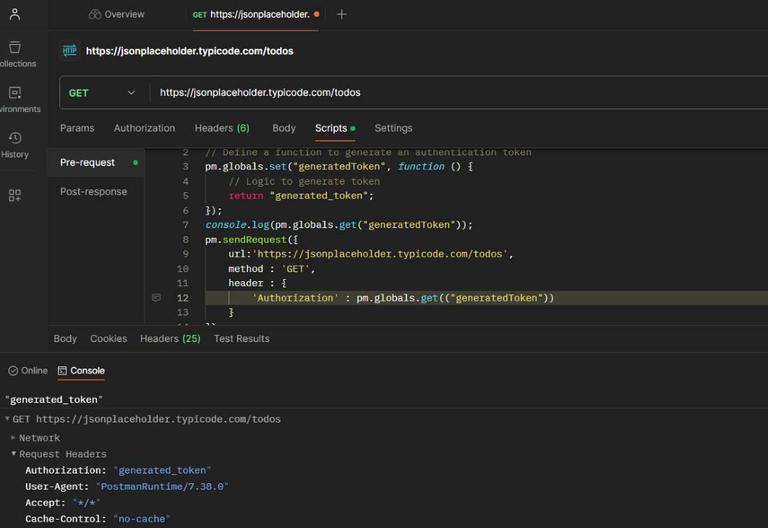
|
|
Postman is a tool for API development that allows developers to create global functions which allows you to define reusable code snippets that can be shared across multiple requests and collections. In this article, we’ll explore how to write global functions in Postman and use them to enhance your API testing workflows. Table of Content Global Functions in PostmanGlobal functions in Postman are JavaScript functions that can be defined at the collection, folder, or global scope. These functions can perform various tasks, such as generating dynamic data, parsing responses, extracting values, or performing validations. By encapsulating common logic into global functions, you can simplify your test scripts, improve code reusability, and maintain consistency across your API tests. Using Pre-request ScriptsPre-request scripts, executed before sending a request in Postman, serve as a prime avenue for defining global functions. Syntax: // Define a function in the pre-request script
pm.globals.set("function_name", function() {
// Function logic here
});
ExampleLet’s create a function to generate an authentication token within the pre-request script: // Define a function to generate an authentication token
pm.globals.set("generatedToken", function () {
// Logic to generate token
return "generated_token";
});
console.log(pm.globals.get("generatedToken"));
pm.sendRequest({
url:'https://jsonplaceholder.typicode.com/todos',
method : 'GET',
header : {
'Authorization' : pm.globals.get(("generatedToken"))
}
});
Steps to Implement Pre-request Scripts
 Pre-requisites Scripts Using Environment Variables:Environment variables within Postman provides the storage of key-value pairs, allowing for the definition of JavaScript functions. Syntax: // Define a function within an environment variable
pm.environment.set("variable_name", function() {
// Function logic here
});
Example// Define a function to calculate a hash value
pm.environment.set("calculateHash", function(data) {
return function(data) {
console.log("Setting calculateHash function"); // Log for debugging
const CryptoJS = require("crypto-js");
// ... (function logic)
return CryptoJS.SHA256(data).toString();
}});
// Access the function from an environment variable
var hashedData = pm.environment.get("calculateHash")("secret_data");
console.log(hashedData)
Steps to Implement Environment Variables
 Environment Variables Using Collection VariablesCollection variables, similar to environment variables, store data and can house JavaScript functions. Syntax: // Define a function within a collection variable
pm.collectionVariables.set("variable_name", function() {
// Function logic here
});
ExampleLet’s create a function to format a date and store it in a collection variable: // Define a function to format date
pm.collectionVariables.set("formatDate", function(){
return function(date) {
var moment = require('moment');
return moment(date).format("YYYY-MM-DD");
}});
// Access the function from a collection variable
var formattedDate = pm.collectionVariables.get("formatDate")(new Date());
console.log(formattedDate);
Steps to Implement Collection Variables
 Collection Variables Defining Functions in Collection ScriptsCollection scripts, executed before or after the entire collection run, offer a venue for defining global functions. Syntax: // Define a function in the collection script
function functionName() {
// Function logic here
}
ExampleLet’s define a function to log request details within the collection script. // Define a function to log request details
function logRequestDetails(request) {
console.log("Request URL:", request.url);
console.log("Request Method:", request.method);
}
// Access the function from any request within the collection
logRequestDetails(pm.request);
Steps to Implement Collection Scripts
 Collection Scrips ConclusionPostman’s global functions helps you to reduce redundancy and promote code reusability, streamlining testing and automation workflows. By using pre-request scripts, environment and collection variables, or collection scripts, you can encapsulate common logic and enhance productivity and code quality. |
Reffered: https://www.geeksforgeeks.org
| Web Technologies |
| Related |
|---|
| |
| |
| |
| |
| |
Type: | Geek |
Category: | Coding |
Sub Category: | Tutorial |
Uploaded by: | Admin |
Views: | 13 |